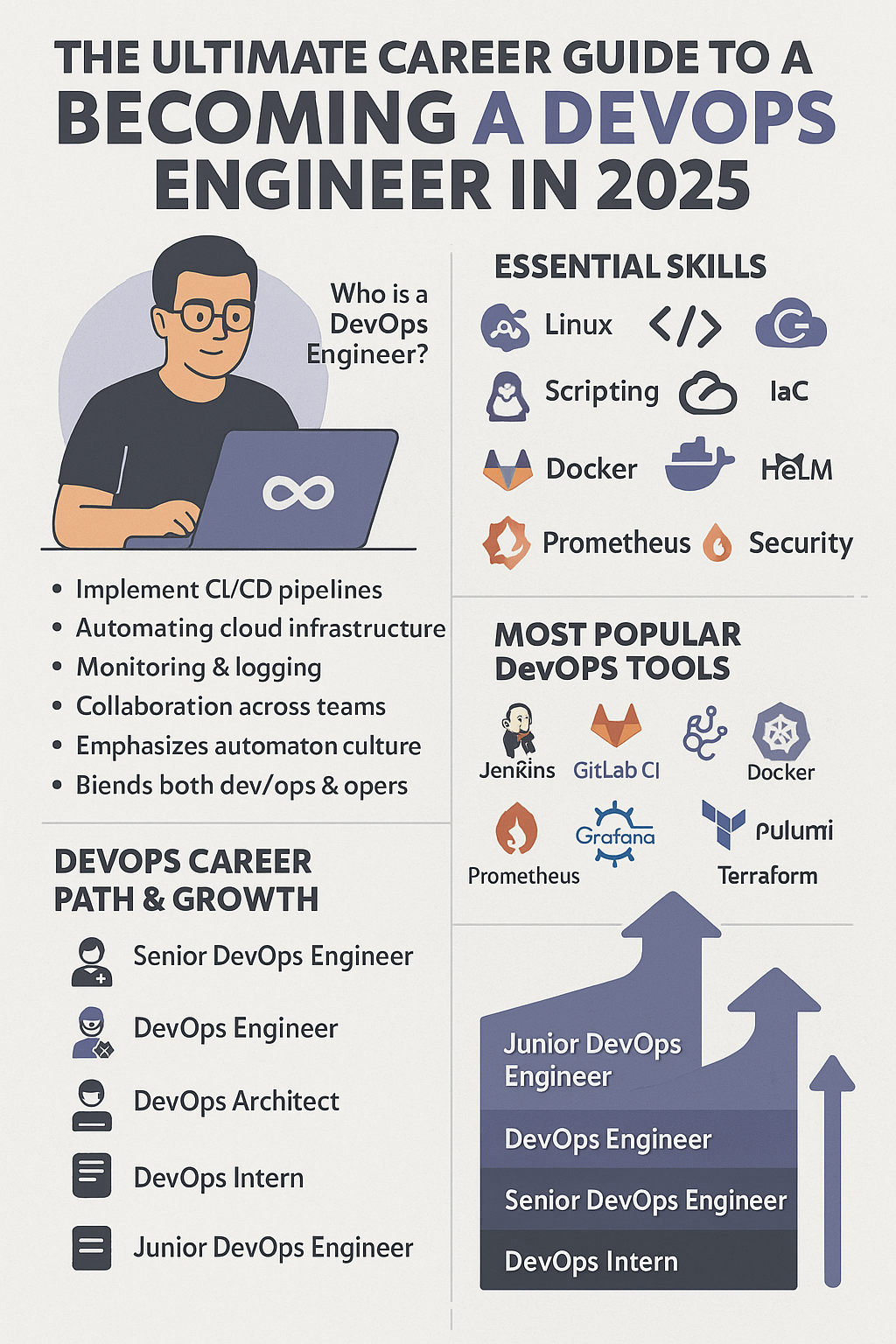Introduction
In a world driven by continuous innovation and fast-paced software delivery, DevOps has become the glue between development and operations. It ensures that code reaches production faster, safer, and more efficiently. Whether you’re a developer, system admin, or fresh tech graduate, entering DevOps in 2025 opens the door to high-impact roles, lucrative salaries, and the power to automate the future.
Who is a DevOps Engineer?
A DevOps Engineer bridges the gap between developers and IT operations. They implement automation across the software lifecycle—from code integration to production deployment. A successful DevOps engineer wears many hats: coder, infrastructure manager, security enforcer, and deployment strategist.
Why Choose DevOps in 2025?
Global Demand: DevOps is one of the most in-demand IT roles.
Versatile Skillset: Apply across development, cloud, security, and SRE roles.
High Salaries: Average DevOps salaries exceed $100K globally.
Tool Variety: Work with cutting-edge tools and practices.
Work Flexibility: Remote jobs and freelance contracts are abundant.
Core Responsibilities of DevOps Engineers
Automating build and deployment pipelines (CI/CD)
Managing infrastructure using code (IaC)
Monitoring system health and app performance
Ensuring security in deployments (DevSecOps)
Collaborating across development, QA, and IT
Essential Skills for DevOps Engineers
Operating Systems: Linux and Windows command-line mastery
Scripting: Bash, Python, Groovy for automation tasks
Version Control: Git and branching strategies
Cloud Computing: AWS, Azure, GCP
CI/CD Pipelines: Jenkins, GitLab CI, GitHub Actions
Containerization: Docker and Kubernetes
Monitoring & Observability: Prometheus, Grafana, ELK Stack
Networking & Security: SSL, firewalls, IAM, VPCs
Most Popular DevOps Tools in 2025
CategoryToolsCI/CDJenkins, GitHub Actions, GitLab CI, CircleCIContainerizationDocker, PodmanOrchestrationKubernetes, Helm, OpenShiftInfrastructure as CodeTerraform, Ansible, Pulumi, CloudFormationMonitoringPrometheus, Grafana, Datadog, New Relic, ELK StackVersion ControlGit, GitHub, Bitbucket, GitLab
Programming and Scripting for DevOps
Bash/Shell – For scripting deployments and server tasks
Python – Automation scripts, DevOps utilities
Groovy – Used in Jenkins pipelines
YAML – Declarative format for Kubernetes, GitHub Actions
JSON – API and configuration management
Cloud Platforms Every DevOps Must Know
AWS: Most adopted, offers EC2, S3, ECS, Lambda
Azure: Popular in enterprise and .NET-heavy stacks
Google Cloud: Preferred for AI/ML workloads
Hybrid/Multi-cloud: Skills in managing cross-cloud workloads is a plus
CI/CD Tools You Should Master
Jenkins – The classic open-source CI/CD tool
GitHub Actions – Popular for developers and integration with GitHub
GitLab CI – Built-in CI/CD pipelines with GitLab
CircleCI – Cloud-native CI/CD with fast build times
Azure DevOps – Excellent for end-to-end Azure integrations
Infrastructure as Code (IaC) Tools
IaC allows you to automate the setup of environments:
Terraform – Cloud-agnostic and declarative
Ansible – Ideal for configuration management
Pulumi – Supports real languages like Python, JS
AWS CloudFormation – AWS-native IaC solution
Monitoring and Logging Tools
Prometheus + Grafana – Open-source powerhouse for metrics
ELK Stack (Elasticsearch, Logstash, Kibana) – Centralized logging and analytics
Datadog / New Relic – Full observability platforms with AI alerting
Containers & Orchestration
Docker: Build and manage containerized applications.
Kubernetes: Industry standard for orchestrating containers.
Helm: Kubernetes package manager.
OpenShift: Red Hat’s Kubernetes platform with security layers.
DevOps Career Path & Growth
LevelTitleEntry-LevelDevOps Intern / Junior DevOpsMid-LevelDevOps Engineer / SRESenior-LevelSenior DevOps / DevSecOps LeadAdvancedPlatform Engineer / Cloud EngineerExpertDevOps Architect / Engineering Manager
DevOps Certifications in 2025
AWS Certified DevOps Engineer
Certified Kubernetes Administrator (CKA)
Azure DevOps Engineer Expert
Docker Certified Associate
HashiCorp Certified: Terraform Associate
Google Professional DevOps Engineer
Remote Work and Freelancing in DevOps
DevOps is perfect for remote work—everything is scriptable, accessible via SSH, or managed in the cloud. Platforms like Toptal, Upwork, and LinkedIn offer freelance gigs ranging from CI/CD builds to full-stack automation.
Top Industries Hiring DevOps Engineers
SaaS (Software as a Service)
Finance and Banking (DevSecOps demand)
eCommerce & Logistics
Government and Defense
AI/ML Infrastructure startups
Best Practices for Succeeding in DevOps
Automate everything: From deployments to alerts.
Think security-first: Secure secrets, pipelines, and APIs.
Version control everything: Infrastructure, scripts, and docs.
Measure and observe: Metrics-driven decisions are key.
Keep learning: Tools evolve—so should your skills.
Conclusion
The future of DevOps is bright, automated, and cloud-native. It offers one of the most versatile, well-compensated, and impactful roles in the tech industry. Whether you’re coming from development, sysadmin, or QA, mastering DevOps in 2025 puts you at the heart of modern software engineering.
FAQs
Is coding mandatory for DevOps?
Basic scripting (Bash, Python) is essential. Deep programming is optional.
Which cloud platform is best for DevOps?
AWS leads the market, but Azure and GCP are valuable too.
Do DevOps engineers need Kubernetes?
Yes—Kubernetes is widely adopted and often a job requirement.
Is DevOps suitable for beginners?
Yes, start with Linux, Git, scripting, and slowly add tools like Docker and Jenkins.
How long does it take to become a DevOps engineer?
With consistent learning, 6–12 months can land you an entry-level role.
Is DevOps a stressful job?
Not inherently. Automation, good tooling, and alerting reduce stress over time.

No Responses